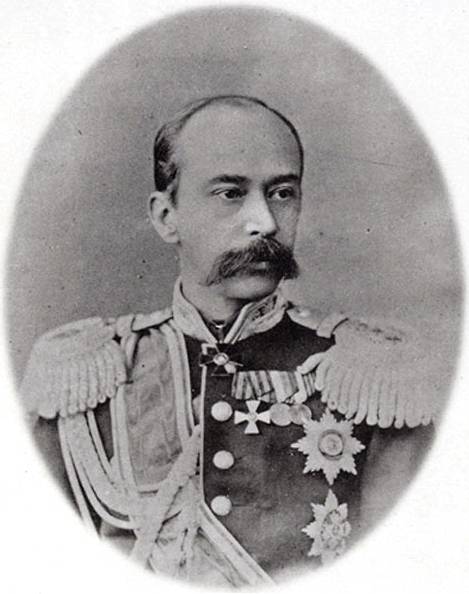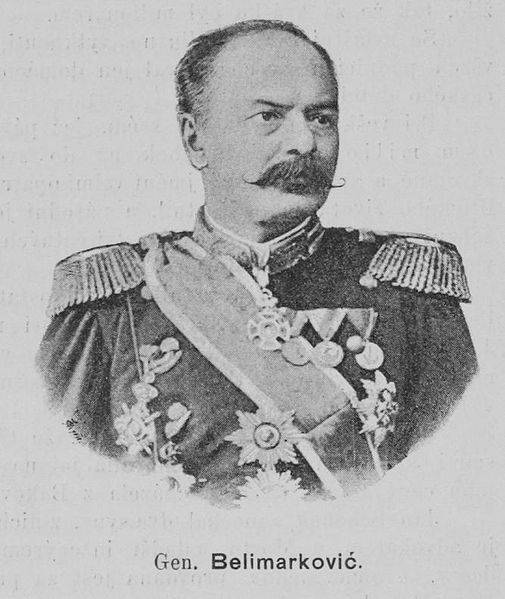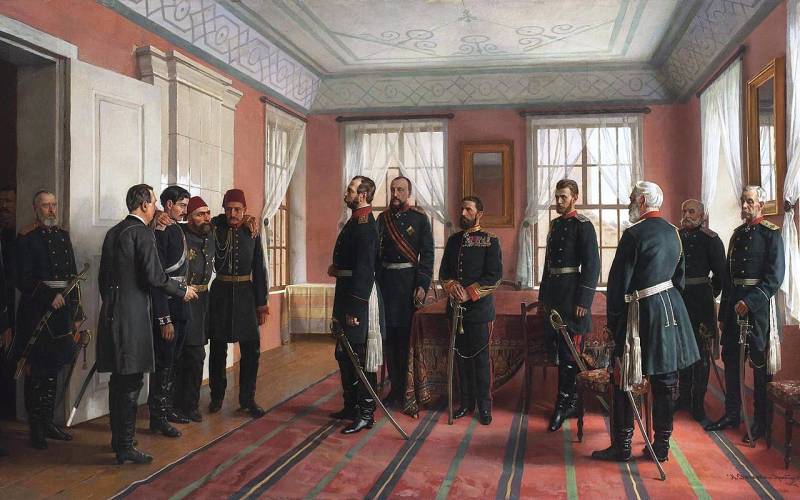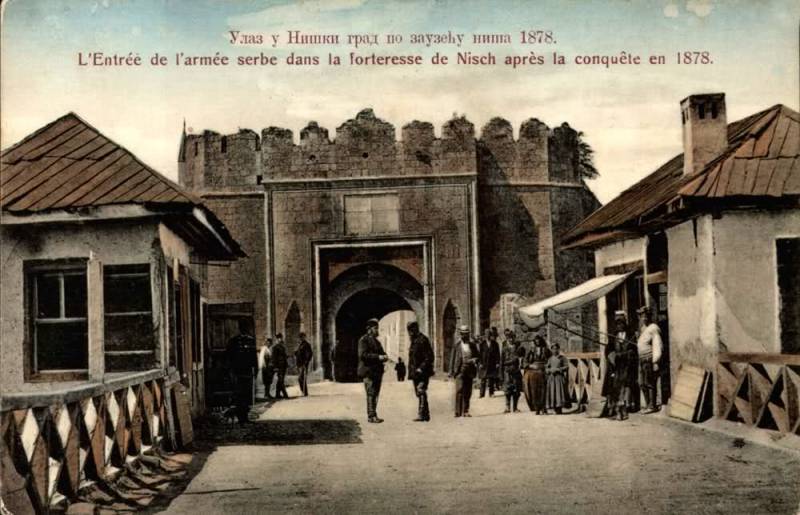Breakthrough of the Russian army through the Balkan Range
In December 1877, Serbia entered the war. The Serbian army took Pirot with a swift blow, and then took Nis. Thus, the Serbs provided the right wing of the advancing Russian army.
prehistory
By the end of 1877, the strategic situation in the Balkan and Caucasian theaters was in favor of the Russian Empire. In the Caucasus, the Russian army in October inflicted a crushing defeat on the Ottomans in the Avlar-Aladzhinsky battle, in November, the Russian soldiers took the strategic Karsky fortress of the enemy with a bold nighttime assault. Simultaneously with the siege of Kars, Russian troops defeated the Turkish forces at Erzerum and besieged this fortress - the most important base and stronghold of Turkey in the Caucasus.
However, due to the mistakes of Erzurum’s command, it was not possible to take it on the move, and the siege in the conditions of winter in the mountains led to unjustified losses. The troops were located in tents, froze. Snow made mountain roads impassable. The supply of food and other supplies has decreased dramatically. The shoes of the soldiers were leaky or even collapsed. In addition, an epidemic of typhoid, literally mowing troops. In the companies there were no people left to serve. As a result, the Erzurum winter blockade was comparable for the Russian army with a fierce bloody battle. 20 killed thousands of soldiers. The commander of the siege corps, General Gaiman, also died of typhus. As a result, by 21 in January of 1878, when a truce was concluded, Erzerum could not be taken. But in general, Turkey suffered a defeat on the Caucasian front.
In the Black Sea, the Turkish fleet, which had a complete advantage over the Russian naval forces, which had not yet been restored after the abolition of the restrictive articles of the Paris world in 1856, could not realize its superiority. Young talented officer S.O. Makarov solved the task of neutralizing the enemy fleet with the help of the "mosquito fleet" - mine boats, including those carried on ships. The ship “Grand Duke Constantine” was used as such a steamer-uterus of mine boats. In addition to Konstantin, six more steamships, called active steamships, were armed and equipped. They made up a special squad. Mine boats have become formidable weapons fighting on the Black Sea. In the future, Makarov, learning. The first models of torpedoes arrived at the fleet's armament, demanded their delivery to the theater of operations, in order to use bulky and unreliable mines in return. Were created devices for firing torpedoes from boats - keel and carpenter vehicles. The keel apparatus was a tube reinforced under the keel. The torpedo was produced using levers from the boat. The float apparatus was simpler in design: the torpedo was located on a raft towed by a boat. For the release of a torpedo carp was brought to the board of the boat
15 (27) December 1877, the first in stories attack boats armed with torpedoes. At night, the steamer "Konstantin" approached Batum and, at a mile from the coast, lowered four boats, two of which were armed with torpedoes. At the Chesma boat, the torpedo was under the keel, with the Sinop - on the raft. Darkness made movement difficult. Having penetrated the raid after midnight, the Russian sailors saw the vague outlines of the Turkish battleship "Mahmudiye" and alternately fired torpedoes. One of the torpedo hit the feed chain and exploded on the ground, the second jumped to the shore. 15 (27) January 1878, on the Batumi raid, the same boats with simultaneous hit of two torpedoes from a distance of about 0,5 cab. destroyed a large watchman Turkish ship "Intibah." As a result, the Turks lost the battle on the Danube and the Black Sea, failed to use their ships to hold back the Russian army’s attack on the coastal flanks and attack the Russian coast and ports.
On the Danube front 28 November (10 December) 1877 of the year, the Oman-Pasha army was defeated by an attempt to break through from Pleven. Osman Pasha's army capitulated, Pleven fell. The right flank of the Russian Danube army was liberated, significant forces of the Russian army were given the opportunity to develop an offensive for the Balkans. Thus, the fall of Pleven and the capture of the army of Osman Pasha radically changed the military-strategic situation in the Balkan theater in favor of the Russian army.
N. D. Dmitriev-Orenburg. Presentation of the captive Osman-Pasha to Alexander II, on the day of the capture of Plevna by the Russian troops
Turkey is looking for peace
Port officially appealed to the great powers, asking for mediation in the conclusion of peace with Russia. Germany, Austria-Hungary, France and Italy avoided this mission. The British government, concerned about the possible appearance of Russians in Constantinople, announced through its ambassador in St. Petersburg, Lord A. Loftus, of its readiness to take on the role of an intermediary in negotiations between Russia and Turkey. Petersburg rejected the offer of London. “Russia agrees to peace,” said Gorchakov’s dispatch, “but ... in order to achieve this goal, the Port must turn to both commanders of the Russian armies in Europe and Asia, who will inform it of the terms of the truce.”
27 November (9 December) 1877 of the year, that is, the day before the fall of Pleven, Tsar Alexander approved a brief draft of the conditions of peace with Turkey. A note on this issue (“Foundations of the World”) was prepared by the Head of the Diplomatic Office under the Commander-in-Chief of the Danube Army, A. Nelidov. In the matter of making peace with the Ottoman Empire, St. Petersburg relied on the support of Austria-Hungary and Germany, therefore the preliminary conditions of peace were very modest so as not to irritate the “European public”. They mainly boiled down to the recognition of the autonomy of Bulgaria and the full independence of Romania, Serbia and Montenegro. Bosnia and Herzegovina, in order not to annoy Vienna, should receive only administrative autonomy. Russia was supposed to return Southern Bessarabia. Territorial changes in the Balkans and in Asia were not specified. Strait mode has not been revised.
The fall of Pleven changed the overall military-political situation in favor of Russia. Petersburg was already more resolute in its demands. As a material guarantee of a truce, the Turkish empire was to cede Russia a number of strategic points and fortresses, such as Erzerum, Vidin, Ruschuk and Silistra. Under the truce received by the commanders-in-chief of the armies in the Balkans and the Caucasus, it was decisively spoken of Bulgaria in its ethnographic borders and the withdrawal of Turkish troops from it. Serbia was supposed to get full independence. The wording on the regime of the Black Sea straits was different: it was necessary, through bilateral agreements with the Porto, to “protect Russia's rights and interests in the Bosphorus and Dardanelles”. Thus, St. Petersburg sought to extract the maximum political and strategic benefits from the military defeat of Turkey.
It is clear that this did not suit London. For a long time, the masters of England sought to limit the growth of Russia's power, weaken and dismember it as much as possible, and throw it away from the seas. To this end, Asian and European countries were inflicting on Russia, trying to act with someone else’s hands and extract the maximum gesheft from all wars and conflicts. 13 (25) December 1877 of England’s Foreign Minister E. Derby sent a memorandum to Russian Ambassador P.A. Shuvalov: if Russian troops occupied Constantinople or Dardanelles, his Majesty’s government would consider itself “free in further actions necessary to protect British interests” . The document emphasized that "the occupation of Constantinople by Russian troops, even if of a temporary nature and only for military reasons, would be an event that it is desirable to avoid by all possible means (at any cost)." Thus, England openly threatened Russia with war if the Russians occupied Constantinople and the straits.
The English press immediately inflated military hysteria. The British excelled at the fabrication of Russian conquest plans in the Balkans and the East. Everything in history is repeated in one way or another, we see a similar situation at the present time, when Russia is painted as a "resident evil", "Russian Mordor", who wants to enslave free countries. The masters of the West have used working schemes for centuries, and the duped population easily absorbs such images.
The British Parliament, convened ahead of time, granted the government an emergency loan for the needs of the army at 6 million pounds sterling and approved the decision of the cabinet to send the British fleet to the Sea of Marmara. The demonstrative actions of England, supposedly ready for war, were intended to intimidate Petersburg, to force the tsarist government to abandon the desire to occupy the straits. That is, the owners of London sought to deprive the Russian well-deserved rewards. Do not let the Russians solve the thousand-year task of mastering Constantinople-Tsargrad and the straits. In reality, England herself could not fight with Russia - she did not have a land army to solve strategic tasks in the Caucasus and the Balkans, to support Turkey. The British sought to intimidate the Russian government and at the same time frighten Western Europe with the “Russian threat”, force it to rally against Russia, to deprive it of the fruits of victory.
Serbia enters the war
Another success of Russia was the entry into the war of Serbia. Prior to this, the Serbian government adhered to the peace agreement with Turkey, concluded in February 1877. Serbia lost the war 1876-1877's. and needed a peaceful respite. On the whole, such a position at first corresponded to the cautious line of the government of Alexander II, which feared that the new performance of the Serbs would only complicate the general situation and could lead to the formation of an anti-Russian coalition of European powers. In the summer of 1877, the Russian emperor advised Prince Milan not to intervene in the war.
However, after the forcing of the Danube and the deployment of hostilities in Bulgaria, when the idea of the “Russian Blitzkrieg” failed, it became clear to the Russian High Command that involving Serbia in the war has a number of strategic benefits. The blow of the Serbian army in Turkey could divert significant forces and means of the enemy, provide the right flank of the Russian army. The failures of the Russian army at Plevna showed that it is extremely important to disperse the Turkish forces. Petersburg promised the Serbs to allocate a million rubles as soon as their troops are concentrated on the Turkish border. In August 1877, half of this subsidy was transferred to Belgrade, in October the rest was transferred.
To check the readiness of the Serbian army for war, the colonel of the General Staff G. I. Bobrikov was sent to Belgrade. Tsar Alexander directly told him: “Now we have lingered under Plevnoi, probably for a long time, and we would probably have a good time if the Serbs had time to pull off part of the Turkish army. From here, you understand that, the sooner this is done, the better ... ". In the General Headquarters, Bobrikov was handed instructions on the need to study the condition and needs of the Serbian army in anticipation of the outbreak of war with Turkey.

Georgy Bobrikov (1840 — 1924)
However, the Serbian leadership was in no hurry to declare war on Turkey. After major failures of the Russian Danube army under Plevna, the Serbs believed that the outcome of the war would be determined only in the spring of 1878. It was decided to postpone the entry of Serbia into the war until the situation becomes clearer. Foreign Minister Ristic said in a conversation with Bobrikov that Serbia could not oppose the Ottoman Empire earlier than March.
Belgrade’s calculations to delay the war were not justified. The fall of Pleven and the capitulation of Osman Pasha’s army were decisive in the further course of the war. Belgrade stopped hesitating and decided it was time to fight. 1 (13) December 1877, Serbia declared war on Turkey. To the princely proclamation it was said: “Serbs! If the Port threatens us at the moment of the greatest danger from the army of one of the most powerful powers, we cannot miss this opportunity in order not to ensure our future once and for all ... Although the valiant Russian army can, without our help, triumph in the holy cause ... nothing in the world can not free us from the fulfillment of the duty falling on the Serbian nation ... ". The appeal ended with the words: “Forward! In the name of the liberation of our oppressed brothers, in the name of the independence of our dear Serbia! ”The Serbian people welcomed this message with approval. It was a war of liberation. The Serbian army, which, in fact, was still the people's militia, was eager to rush into battle and put an end to the rule of the Turkish Empire in the Balkans. But Belgrade could embroider its sphere of influence on the peninsula.
The Serbian army attacked as soon as Prince Milan declared war on Turkey. Thousands of 81,5 people with 232 guns were placed under the gun. Most of these forces (56,5 thousand soldiers and 178 guns) were located on the south-eastern border of the country, the rest of the troops covered the western border. The whole army was divided into five corps: Timok, Moravian, Yavorsky, Drinsky and Shumadi. The Serbian army was better prepared for war than during the 1876-1877 war. Her fighting spirit was high. Serbian warriors were ready for the sacrifices in a great and sacred struggle with Turkey. The officers had combat experience. However, the military personnel was not enough, which adversely affected the combat training of the troops and their organization. Serbian artillerymen were well prepared, soldiers were physically resilient and brave, they endured well all the warfare (Serbs have been warriors since ancient times). But the Serbian cavalry resembled a crowd and was poorly suitable even for reconnaissance.
The Russian military adviser Bobrikov played a leading role in the planning of military operations of the Serbian army. “I was very pleased with the independent role of the head of the Serbian military operations,” he wrote. “... Now I gave myself the floor at the slightest opportunity to lead the Serbs forward, bypassing the Turkish fortresses and avoiding attacks from the enemy positions without a correct calculation of success.” The strategic plan proposed by Bobrikov and approved by the prince of Milan envisaged a main strike from the Zaichar region in the direction of Pirot, Sofia. This fully corresponded to the interests of the Russian command. The offensive of the Serbian army was to ensure the right wing of the Danube army, assist the detachment of I. V. Gurko in overcoming the Balkan Mountains and liberating Sofia. The Timok and Shumadi corps under the command of General Belomarkovich were involved in the attack on the main line. Observation of the fortress of Niš, which remained in the rear, was to be led by the Moravian Corps. The Yavorsky and Drinsky Corps carried out auxiliary operations in the south-western direction, towards Montenegro.
The troops of Belomarkovich bravely went on the offensive and took several enemy strongholds. 12 (24) December turned the battle for Pirot. First, the Serbs attacked the Turkish fortifications Ak-Palanka, located on the northwestern approaches to Pirot. After the threat of a detour, the Turkish garrison (about 2 thousand people) ran along mountain paths to Pirot and Vranya. The Serbs seized food and fodder stores. This victory strengthened the morale of the Serbian army, gave them a stronghold and food supplies on their way to Pirot. The Turks were cut off from Niš. 15 (27) December Serbian troops, with the support of artillery, attacked Pirot. The Serbs abandoned the frontal attack and tried to bypass enemy positions on the flanks. The Turks withdrew in the center, but remained on the flanks. The large numerical superiority of the Serbian army and the seizure of the dominant heights by them forced the Ottomans to abandon further resistance. 16 (28) December Serbs entered Pirot. The Turkish garrison, consisting of the 12 battalions, retreated to Sofia. Serbs have captured rich trophies: 28 guns, 300 crates with shells, about 1,5 thousand guns, over 1 thousand cartridges of cartridges.

General Belomarkovich (1827 - 1906)
Thus, the Serbs fulfilled their allied duty. They distracted the attention of the Sofia grouping of the enemy and thus assisted the troops of Gurko during the crossing of the Balkan Mountains. 16 (28) December Pirot fell, and 17 (29) December, Russian troops have already descended from the Balkans. Gurko squad went to Sofia. The flanks of the Allied armies closed. After the liberation of Sofia, the Serbs, together with the Russians, participated in the destruction of the Turkish group that had been thrown back from Sofia.
The capture of Pirot and the liberation of the Russian army by Sofia gave the Serbian forces the opportunity to concentrate on mastering Nis. It was a strategic enemy fortress with strong fortifications. Here the Turks staged an arsenal and food base. The approaches from the north were especially well fortified. The defense was built taking into account the terrain features. In the armament of the fortress there were large Krupp fortress guns on metal platforms. The garrison consisted of 6 battalions, a squadron of regular cavalry and two field batteries (about 5 thousand people in total). The Serbs transferred troops to Nisha that had been liberated after the capture of Pirot. Artillery was pulled. Having taken several fortified positions on the approaches to the fortress, the Serbs offered the enemy to capitulate. The soldiers were promised free access from the fortress, after the surrender of weapons. The civilian population was guaranteed safety. The Turks refused to capitulate.
In the evening of December 28 1877 (January 9 1878), the Serbian artillery opened fire on the Niš fortress, and the Serbs went to the assault. The main blow was delivered from the south, where the fortifications were weaker. There were only hastily erected fortifications on the heights of Goritsa and Grabovets. The Turks repulsed the first attack on Goritsa, but having received reinforcements, the Serbs went forward again and achieved success. Fortifications on Grabovitsa were also captured. 29 December Turkish garrison surrendered. Serbs captured rich loot: 267 guns (including Krupp 26), more than 13 thousand guns, 780 revolvers, up to 8 million cartridges, 20 thousand grenades and other ammunition, as well as huge stocks of supplies and fodder.
Thus, the Serbian army solved the main tasks of its offensive. The Serbs eliminated the threat to the right flank and rear of the Russian army, which had begun a breakthrough in the direction of Constantinople. The further offensive of the Serbian army was intended to occupy as much territory as possible in order to achieve maximum concessions from it when concluding peace with Turkey. The new strategic plan called for an offensive in different directions of the three corps - Shumadi, Moravian and Tymoksky. All alone had to go to Kosovo field.
Liberating Niche
To be continued ...


Information